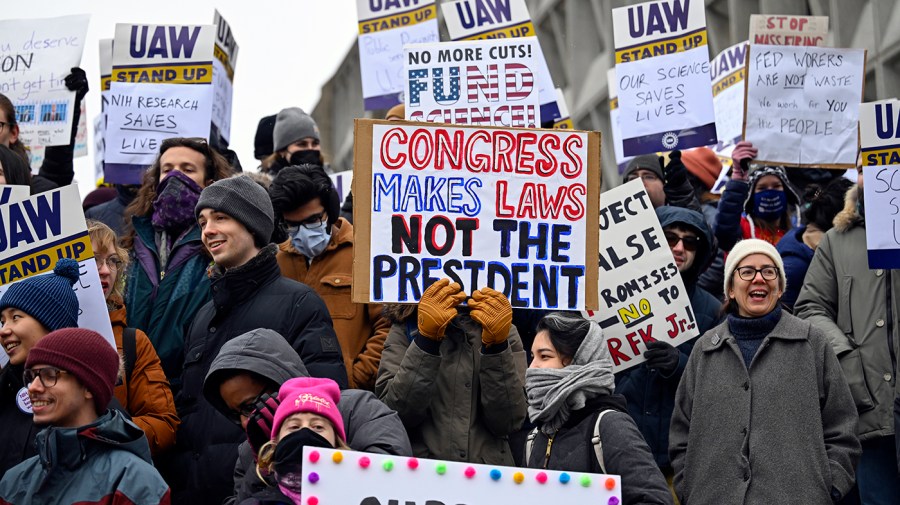
The Trump administration’s effort to reshape the federal government through Elon Musk and his Department of Government Efficiency (DOGE) is raising fears among public health experts, researchers and advocacy groups of a massive brain drain and dire impacts to public health.
Termination letters hit the inboxes of thousands of workers across health agencies in just the past week as the administration took a sledgehammer to the federal government.
The employees worked on projects including studying infectious diseases, medical device safety, food safety, lowering health costs and improving maternal health outcomes. All of them are now out of a job.
“The federal government has a huge footprint. [These layoffs] will interrupt all fields of research. Every phase of our scientific endeavor has been interrupted, including that research that is essential for our national security,” said Georges Benjamin, executive director of the American Public Health Association.
Benjamin said there’s a real fear the Trump administration will cause so much damage that the next generation of scientists will avoid the public sector completely.
“I am very concerned that this generation of people will be so dissuaded that it’s going to take a lot more work and coaxing and assurances, even when things settle down, to get people to see this as a career that’s dependable,” Benjamin said.
Lawmakers and advocates say lives are at risk if the cuts aren’t reversed.
Senate Democrats sent a letter Friday to Health and Human Services Secretary Robert F. Kennedy Jr. demanding answers about who was fired and whether the agency did any kind of impact analysis beforehand.
“The Trump Administration is firing staff and harming programs that Americans rely on every day, and these arbitrary cuts will endanger children, seniors, and at-risk communities, set medical progress back by decades, curtail patient access to care, and make the nation less prepared for emerging public health threats,” the senators wrote.
Lisa Lacasse, president of the American Cancer Society Cancer Action Network, said in a statement the cuts could “dismantle the critical government infrastructure that has played a pivotal role in cancer survivorship for 18 million individuals who are alive today in the U.S. resulting in more suffering from cancer nationwide.”
“Without the appropriate workforce necessary to drive the essential services and programs within HHS, active clinical trials could be abandoned, the nation’s drug shortages could worsen, the time it takes to review innovative new cancer treatments could lengthen, cancer prevention efforts may be halted and access to lifesaving cancer screenings could be cut off for millions of people in America,” Lacasse added.
One former scientist at the Centers for Disease Control and Prevention was researching human papillomavirus, a viral infection that can sometimes lead to cancer.
But then an email came on a Saturday evening, and the job no longer existed.
“They said, I’m probationary, and have poor performance, and I’m gone,” the person said.
Many of the cuts seemed to center on staffers at the Food and Drug Administration’s food, tobacco and medical device divisions. One former employee, a medical device reviewer, said their team was essentially cut in half overnight.
The employee was probationary, hired just last year as part of a surge in reviewers brought on to help the agency manage its growing backlog of device approvals.
But what was most confusing to the employee was that their position, like many others in FDA’s drug and devices divisions, was funded through industry-paid user fees rather than taxpayer money.
“We spent a lot of money trying to hire these very qualified candidates, because almost everybody in my team has a PhD or a master’s degree and has eight plus years of industry experience,” the employee said. “That’s taxpayer money wasted. You spend all the money hiring people, interviewing people, and now they just fired all of them without any reason.”
Nearly half of the FDA’s $7.2 billion budget comes from fees paid by companies the agency regulates. Under federal law, companies pay user fees to FDA in exchange for their products being reviewed in a timely manner. The user fees allow the agency to hire the extra scientists needed to conduct those reviews.
Device trade group AdvaMed asked HHS to reconsider.
“Unfortunately, as a result of these reductions, FDA will lose hundreds of new employees, the best and most innovative hires under our most recent agreement,” AdvaMed President and CEO Scott Whitaker said in a statement.
A current employee of the FDA’s food safety division said 10 scientists were cut from their office of 90.
“What’s going to happen with the work that they were in the middle of doing?” the person said. “We’re already understaffed … just to get these new people coming in the past year or two is a huge help, but we’re still below what we need. We’re close to our backs breaking, to be honest with you, to make up for all the work that the rest of us will pick up.”
Another current food division employee described confusion around the firings, as even managers didn’t know who was being let go, or when.
“We suspected they might be coming, but you know, none of our leadership knew … our office is still trying to take stock of who was even fired,” the employee said.
The mood during a recent officewide conference call was “like a wake. The grief is palpable,” the person said.
But the person said the attitude of the employees who remain is a testament to the career civil servants who are being maligned by President Trump, Musk and DOGE.
“How do we figure out what they were working on? How do we figure out who’s going to take that work? We’re going to keep doing what we said we were going to do, just keep the food supply safe,” the employee said.

